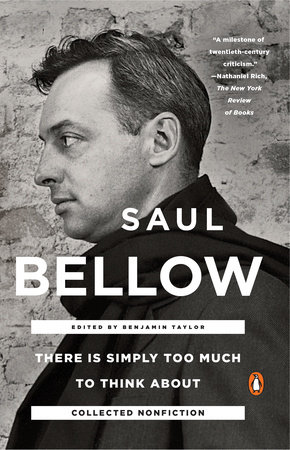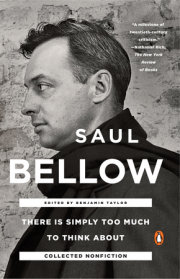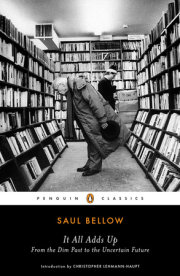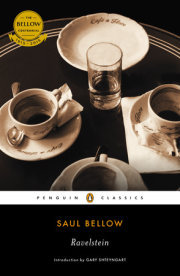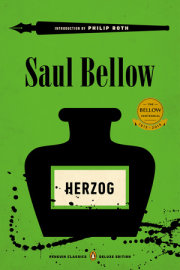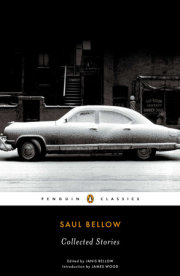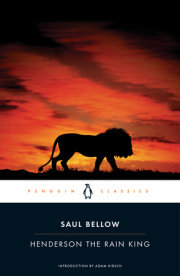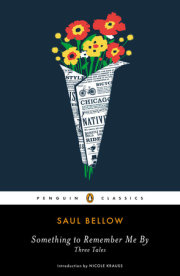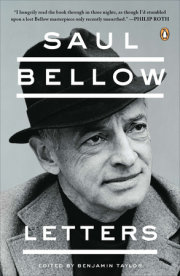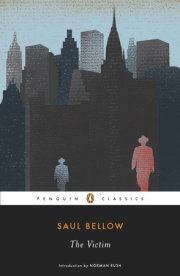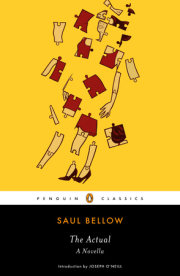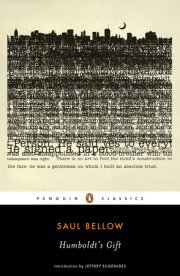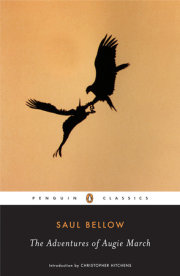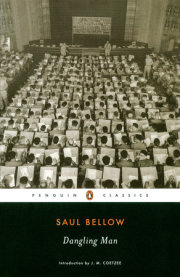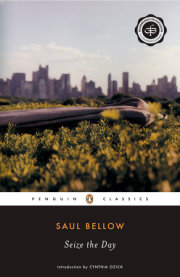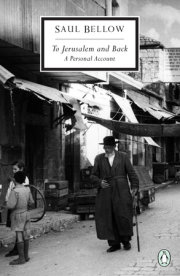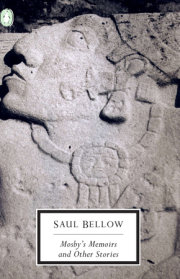Prologue: Starting Out in Chicago
What was it, in the Thirties, that drew an adolescent in Chicago to the writing of books? How did a young American of the Depression period decide that he was, of all things, a literary artist? I use the pretentious term literary artist simply to emphasize the contrast between such an ambition and the external facts. A colossal industrial and business center, knocked flat by unemployment, its factories and even its schools closing, decided to hold a World’s Fair on the shore of Lake Michigan, with towers, high rides, exhibits, Chinese rickshaws, a midget village in which there was a midget wedding every day, and other lively attractions including whores and con men and fan dancers. There was a bit of gaiety, there was quite a lot of amoebic dysentery. Prosperity did not come back. Several millions of dollars were invested in vain by businessmen and politicians. If they could be quixotic, there was no reason why college students shouldn’t be impractical too. And what was the most impractical of choices in somber, heavy, growling, lowbrow Chicago? Why, it was to be the representative of beauty, the interpreter of the human heart, the hero of ingenuity, playfulness, personal freedom, generosity and love. I cannot even now say that this was a bad sort of crackpot to be.
The difference between that time and this is that in the Thirties crackpots were not subsidized by their families. They had to go it alone for several years. Or at least until the New Deal (thanks largely to Harry Hopkins) recognized that a great government could buy the solution of any problem and opened WPA projects in many parts of the country. I think it possible that Hopkins and Roosevelt, seeing how much trouble unhappy intellectuals had made in Russia, Germany and Italy between 1905 and 1935, thought it a bargain to pay people twenty-three dollars a week for painting post office murals and editing guidebooks. This plan succeeded admirably. If I am not mistaken, America continued to follow the Hopkins hint in postwar Europe and perhaps in Vietnam.
I know, for instance, that John Cheever has been conducting creative writing courses at Sing Sing. Writers and criminals have often found that they had much in common. And correctional officials seem to understand, thanks to the psychology courses they take in the universities, that it is excellent therapy to write books and that it may soften the hearts of criminals to record their experiences. Politicians, too, when they fall from power or retire, become writers or university professors. Thus Hubert Humphrey and Dean Rusk became lecturers, Eugene McCarthy became a poet and an altogether different sort of politician, Spiro Agnew, a novelist. Interviewed not long ago in The New York Times, Mr. Agnew said that, having suffered greatly, he felt the need to do something creative to recover his spirits and was setting to work writing a novel because he was not yet strong enough to do serious mental work.
But I started out to recall what it was like to set oneself up to be a writer in the Midwest during the Thirties. For I thought of myself as a Midwesterner and not as a Jew. I am often described as a Jewish writer; in much the same way, one might be called a Samoan astronomer or an Eskimo cellist or a Zulu Gainsborough expert. There is some oddity about it. I am a Jew, and I have written some books. I have tried to fit my soul into the Jewish-writer category, but it does not feel comfortably accommodated there. I wonder now and then whether Philip Roth and Bernard Malamud and I have not become the Hart Schaffner and Marx of our trade. We have made it in the field of culture as Bernard Baruch made it on a park bench, as Polly Adler made it in prostitution, as Two-Gun Cohen, the personal bodyguard of Sun Yat-Sen, made it in China. My joke is not broad enough to cover the contempt I feel for the opportunists, wise guys and career types who impose such labels and trade upon them. In a century so disastrous to Jews, one hesitates to criticize those who believe that they are making the world safer by publicizing Jewish achievements. I myself doubt that this publicity is effective.
I did not go to the public library to read the Talmud but the novels and poems of Sherwood Anderson, Theodore Dreiser, Edgar Lee Masters and Vachel Lindsay. These were people who had resisted the material weight of American society and who proved—what was not immediately obvious—that the life lived in great manufacturing, shipping and banking centers with their slaughter stink, their great slums, prisons, hospitals and schools, was also a human life. It appeared to me that this one thing, so intimately known that not only nerves, senses, mind but also my very bones wanted to put it into words, might contain elements that not even Dreiser, whom I admired most, had yet reached. I felt that I was born to be a performing and interpretive creature, that I was meant to take part in a peculiar, exalted game. For there are good grounds to consider this, together with other forms of civilized behavior and ceremony, a game. At its noblest this game is played, under discipline, before God himself—so Plato said and others as well. The game can be an offering, a celebration, an act of praise, an acknowledgment also of one’s weaknesses and limitations. I couldn’t have put it in this manner then. All that appeared was a blind obstinate impulse expressing itself in bursts of foolishness. I loved great things. I thought I had a right to think of that exalted game. I was also extremely proud, ornery and stupid.
I was, in 1937, a very young married man who had quickly lost his first job and who lived with his in-laws. His affectionate, loyal and pretty wife insisted that he must be given a chance to write something. Having anyone pay attention to my writing wasn’t a real possibility. I am as often bemused as amused at the attention my books have received. Neglect would have been frightful, but attention has its disadvantages. The career of a critic, when I am feeling mean about it, I sometimes compare to that of a deaf man who tunes pianos. In a more benevolent mood I agree with my late father that people must be encouraged to make as honest a living as they can. For this reason I don’t object to becoming a topic. When I visited Japan I saw that there were prayer-and-fortune-telling papers sold for a penny at each temple. The buyers rolled up these long strips of paper and tied them by threads to bushes and low trees. From the twigs there dangled hundreds of tightly furled papers. I sometimes compare myself to one of these temple trees.
So I sat at a bridge table in a back bedroom of the apartment while all rational, serious, dutiful people were at their jobs or trying to find jobs, writing something. My table faced three cement steps that rose from the cellar into the brick gloom of a passageway. Only my mother-in-law was at home. A widow then in her seventies, she wore a heavy white braid down her back. She had been a modern woman and a socialist and suffragette in the Old Country. She was attractive in a fragile, steely way. You felt Sophie’s strength of will in all things. She kept a neat house. The very plants, the ashtrays, the pedestals, the doilies, the chairs revealed her mastery. Each object had its military place. Her apartment could easily have been transferred to West Point.
Lunch occurred at half past twelve. The cooking was good. We ate together in the kitchen. The meal was followed by an interval of stone. My mother-in-law took a nap. I went into the street. Ravenswood was utterly empty. I walked about with something like a large stone in my belly. I often turned into Lawrence Avenue and stood on the bridge looking into the drainage canal. If I had been a dog I would have howled. Even a soft howl would have helped. But I was not here to howl. I was here to interpret the world (its American version) as brilliantly as possible. Still I would have been far happier selling newspapers at Union Station or practicing my shots in a poolroom. But I had a discipline to learn at the bridge table in the bedroom.
No wonder a writer of great talent and fine intelligence like John Cheever volunteers to help the convicts with their stories. He knows how it feels to be locked in. Maybe he thinks the prisoners, being already locked in, may as well learn the discipline. It is the most intolerable of privations for people whose social instincts are so highly developed that they want to be confined in rooms in order to write novels. Nuns fret not, perhaps, but writers do. Bernanos, the French religious novelist, said that his soul could not bear to be cut off from its kind and that was why he did his work in cafés. Cafés indeed! I would have kissed the floor of a café. There were no cafés in Chicago. There were greasy-spoon cafeterias, one-arm joints, taverns. I never yet heard of a writer who brought his manuscripts into a tavern. I have always taken an interest in the fact that Schiller liked to smell apples when he was writing, that someone else kept his feet in a tub of water. The only person whose arrangements seemed to me worth imitating was the mystic and guru Gurdjieff. Gurdjieff, when he had work to do, set forth from headquarters in Fontainebleau with his disciples in several limousines. They carried hampers with caviar, cold fowl, champagne, cheese and fruit. At a signal from the master the cars would stop. They would picnic in a meadow and then, with all his followers around him, Gurdjieff did his writing. This, if it can be arranged, seems to me worth doing.
I am glad to say that I can’t remember what I was writing in Ravenswood. It must have been terrible. The writing itself, however, was of no importance. The important thing was that American society and S. Bellow came face to face. I had to learn that by cutting myself off from American life in order to perform an alien task, I risked cutting myself off from everything that could nourish me. But this was the case only if you granted the monopoly of nutrients to this business-industrial, vital, brutal, proletarian and middle-class city that was itself involved in a tremendous struggle. It was not even aggressively hostile, saying, “Lead my kind of life or die.” Not at all. It simply had no interest in your sort of game.
Quite often, in the Hudson belonging to J.J., my brother-in-law, my mother-in-law and I drove to the cemetery. There we tended her husband’s grave. Her trembling but somehow powerful, spotty hand pulled weeds. I made trips with a Mason jar to the faucet and made water splotches about the nasturtiums and sweet williams. Death, I thought, Chicago-style, might not be such a bad racket after all. At least you didn’t have to drive down Harlem Avenue in rush hour back to the house with its West Point arrangements, with its pages of bad manuscript on the bridge table, and the silent dinner of soup and stew and strudel. After which you and your wife, washing dishes, enjoyed the first agreeable hours of the day.
J.J., my brother-in-law, born Jascha in the old country, practiced law in the Loop. He was a Republican, member of the American Legion, a golfer, a bowler; he drove his conservative car conservatively and took The Saturday Evening Post; he wore a Herbert Hoover starched collar, trousers short in the ankle, and a hard straw hat in the summer. He spoke in pure Hoosier twang, not like a Booth Tarkington gentleman but like a real Tippecanoe country dirt farmer. All this Americanism was imposed on an exquisitely oriental face, dark, with curved nose and Turkish cheekbones. Naturally a warm-hearted man, he frowned upon me. He thought I was doing something foreign.
There was an observable parallel between us. As I was making a writer of myself, this exotic man was transforming his dark oriental traits and becoming an American from Indiana. He spoke of Aaron Slick from Punkin’ Crick, of Elmer Dub: “Ah kin read writin’, but ah can’t read readin’.” He had served in the Army—my wife wore his 1917 overcoat (too small for me) and J.J. told old, really old La Salle Street Republican sex jokes about Woodrow Wilson and Edith Bolling. It was common in that generation and the next to tailor one’s appearance and style to what were, after all, journalistic publicity creations and products of caricature. The queer hunger of immigrants and their immediate descendants for true Americanism has yet to be described. It may be made to sound like fun but I find it hard to think of anyone who underwent the process with joy. Those incompetents who lacked mimetic talent and were pure buffoons were better off—I remember a cousin, Arkady, from the Old Country who declared that his new name was now and henceforth Lake Erie. A most poetic name, he thought. In my own generation there were those immigrants who copied even the unhappiness of the Protestant majority, embracing its miseries, battling against Mom; reluctant, after work, to board the suburban train, drinking downtown, drinking on the club car, being handed down drunk to the wife and her waiting station wagon like good Americans. These people martyred themselves in the enactment of roles that proved them genuine—just as madly wretched in marriage as Abe Lincoln and Mary Todd. Cousin Arkady, a clown who sold dehydrated applesauce on the road, giving dry applesauce demonstrations to housewives in small-town department stores, was spared the worst of it. He simply became “Archie” and made no further effort to prove himself a real American.
The point of this brief account, as I see it, is to evoke that mixture of imagination and stupidity with which people met the American Experience, that murky, heavy, burdensome, chaotic thing. I see that my own error, shared with many others, was to seek sanctuary in what corners of culture one could find in this country, there to enjoy my high thoughts and to perfect myself in the symbolic discipline of an art. I can’t help feeling that I overdid it. One didn’t need as much sanctuary as all that.
If I had to name the one force in America that opposes the symbolic discipline of poetry today as much as brutal philistinisms did before World War II, I would say the Great Noise. The enemy is noise. By noise I mean not simply the noise of technology, the noise of money or advertising and promotion, the noise of the media, the noise of miseducation, but the terrible excitement and distraction generated by the crises of modern life. Mind, I don’t say that philistinism is gone. It is not. It has found many disguises, some highly artistic and peculiarly insidious. But the noise of life is the great threat. Contributing to it are real and unreal issues, ideologies, rationalizations, errors, delusions, nonsituations that look real, nonquestions demanding consideration, opinions, analyses in the press, on the air, expertise, inside dope, factional disagreement, official rhetoric, information—in short, the sounds of the public sphere, the din of politics, the turbulence and agitation that set in about 1914 and have now reached an intolerable volume.
Nadezhda Mandelstam, writing of poets in the Soviet Union, says of the Russian noise: “Nowhere else I believe were real people so much deafened as they were here by the din of life—One after another poets fell silent because they could no longer hear their own voices.” She adds: “The noise drowned out thought and, in the case of millions, conscience as well.” William Wordsworth, nearly two hundred years ago, had expressed his concern over the effects of modern turbulence on poetry. He was right too. But in the language of my youth—“He didn’t know the half of it.”
. All rights reserved. No part of this excerpt may be reproduced or reprinted without permission in writing from the publisher.

